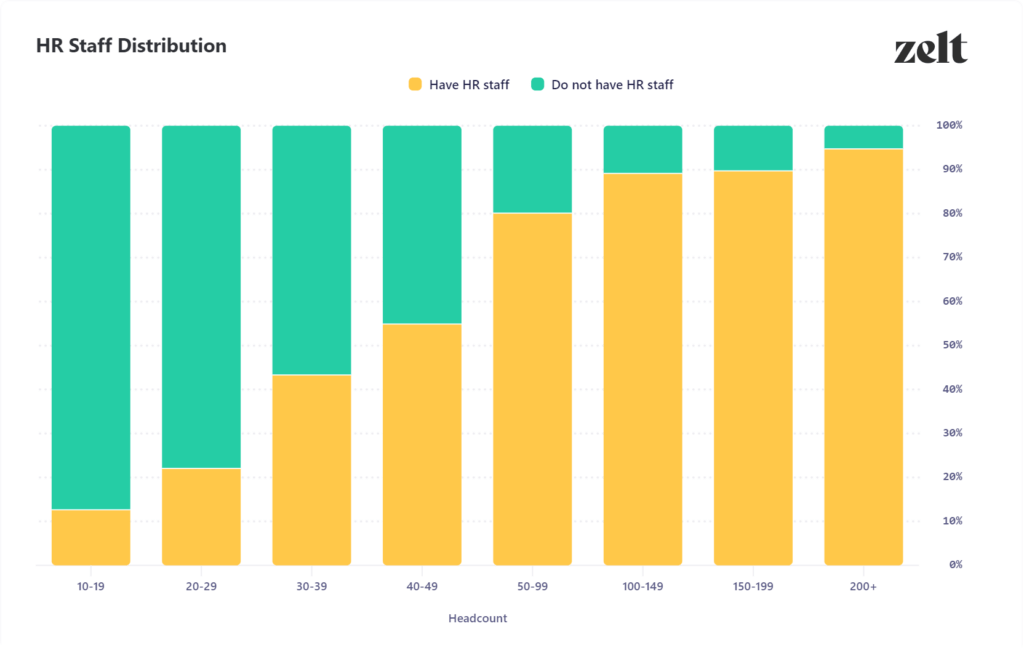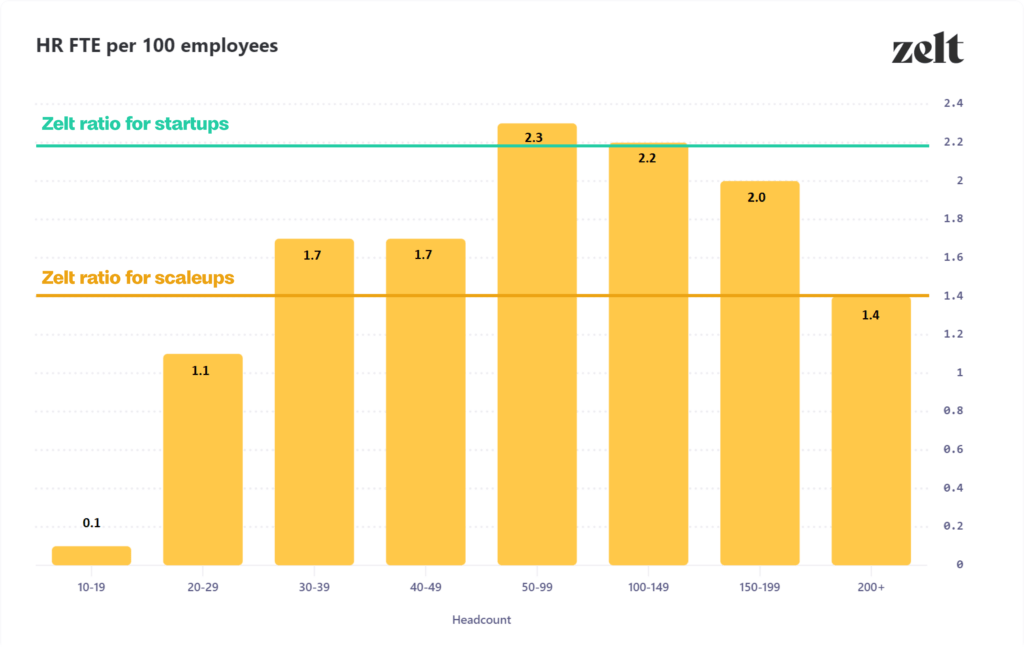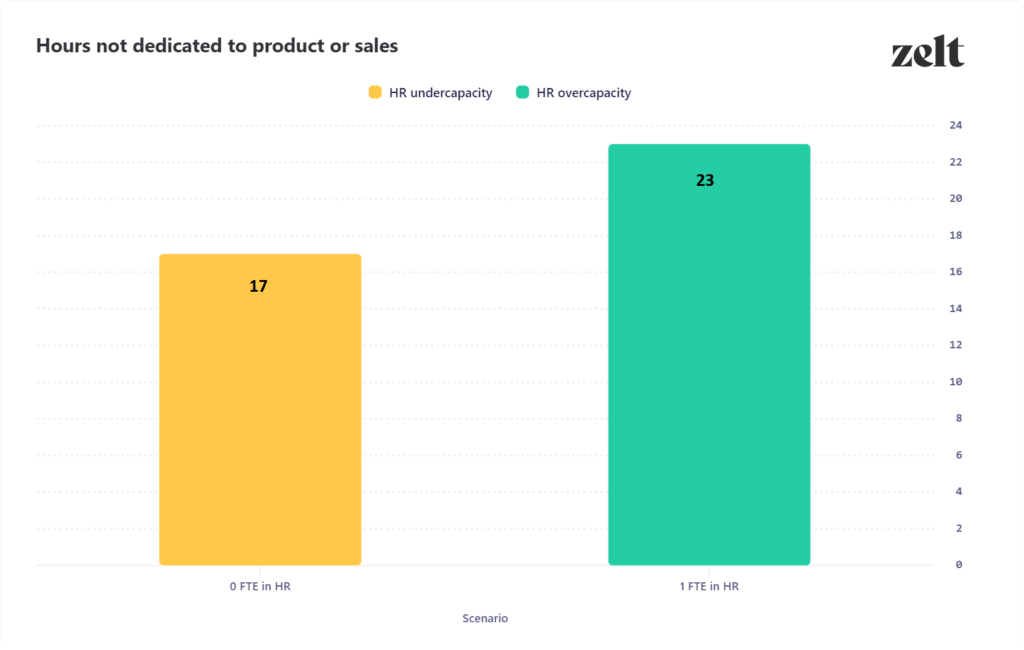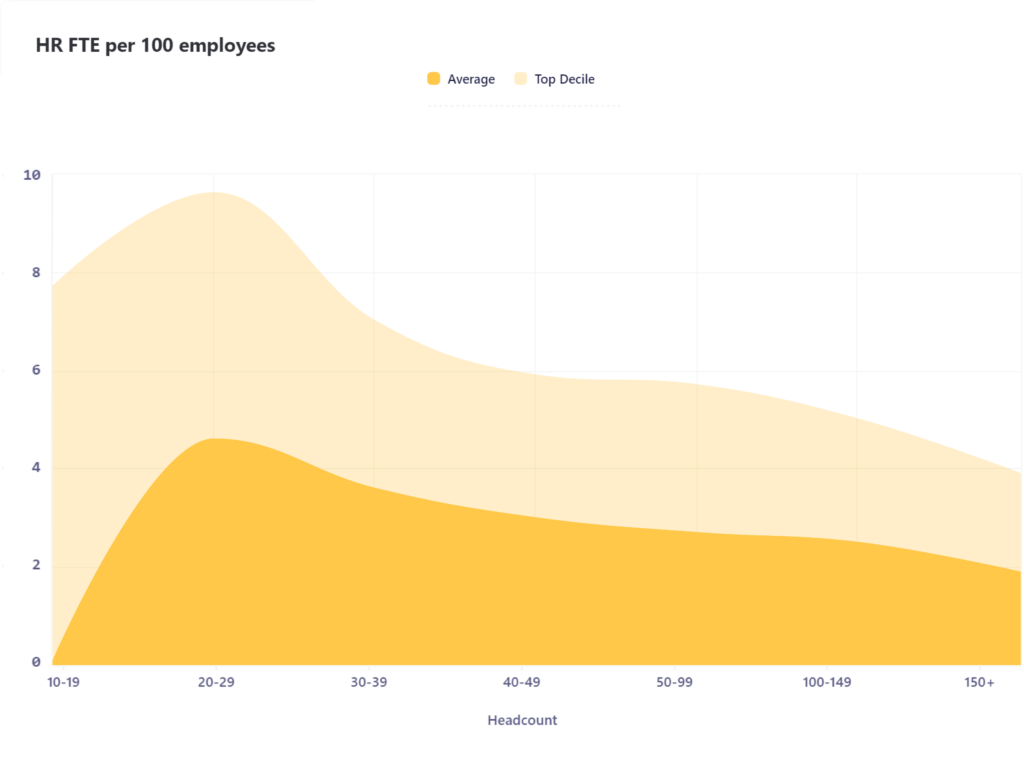When is the right time to make your first HR hire?
The exciting world of startups can be a challenging one. Yet, amidst the thrills of innovation, product development, and customer acquisition, a fundamental aspect
The role of HR in the startup landscape should not be overlooked. It directly impacts how startups can fuel their growth trajectory, bolster operational performance, and shape their organisational culture.
This article delves into the significance of resource allocation to HR in the context of startups, focusing on the timing of the first HR hire, HR headcount, and trends in HR resource requirements based on employee headcount.
The data is made up of 973 UK-based startups that have in total raised between £6m to £60m over the last 30 months.
Average timing of first HR hire for startups
Hiring the first HR professional is a significant milestone in a startup’s journey, and often marks the turning point from being a scrappy group of entrepreneurs looking for product market fit to becoming an established organisation that is laying the groundwork for future growth.
This decision’s timing varies among startups, reflecting the diverse strategies, resources, and growth trajectories.
On average, startups make their first HR hire when their employee count ranges from 40 to 50. By the time they reach a headcount of 100, almost all startups have at least one dedicated HR FTE.
But what is the right time to HR the first HR person and why? The HR ratio helps understand the dynamics.

The HR Ratio among Startups
Analysis of the HR to employee ratio in startups can reveal critical trends, offering insights into their growth strategies and resource allocation. The HR ratio is a measure that indicates the number of Human Resources (HR) FTE per 100 employees. Startups in early stages can use these insights to predict future HR demands, allowing for strategic growth planning that incorporates necessary HR expansion. For more established startups (100+ employees), this ratio is a benchmarking tool, providing a comparison point with similar companies to determine if they’re optimally investing in HR.
The ratio also serves as a measure of HR efficiency. When evaluated alongside performance indicators like employee productivity or revenue per employee, startups can gauge the effectiveness of their HR strategies and pinpoint areas for improvement.
- High HR ratios combined with high productivity could suggest that the outsized investment in the team is paying off.
- High HR ratios coupled with low productivity might indicate a need for reassessing HR practices and other overall organisational issues, possibly focusing on training, talent acquisition or automation.
Changes in HR ratio can also reveal insights. A rapidly increasing HR ratio might hint at high employee turnover, necessitating interventions in areas such as company culture, compensation, or job satisfaction.
Unravelling the Data: Findings and Insights
Our investigation into small companies with 10-40 employees reveals a marked tendency towards minimal HR investment. Within this cohort, only 10% to 41% of companies have a dedicated HR professional. This scenario changes dramatically as the companies grow in size.
Among those with 50-99 employees, over 75% have dedicated HR personnel, with an average HR ratio of 2.3. Such a noticeable shift indicates a clear recognition of HR’s role in managing the unique challenges associated with growth.

When we examine companies with a headcount of 200+, we see that almost all have dedicated HR personnel. However, the HR ratio drops to a lower 1.4 per employee. Various factors drive this change, including
- Higher level of HR specialisation (e.g., talent and engagement)
- Dedicated teams for non-core HR tasks (e.g., IT and payroll)
- Better software tools
- Higher level of systems integration and automation
- General economies of scale
- the way the metric is built (difficult to measure HR FTE below 1)
Larger companies manage to eliminate a significant chunk of administration-related HR work through the use of software and automation technology, which according to McKinsey, can account for 50-80% of total HR work.
Therefore, for VC-backed startups, our research suggests that the benchmark for an HR: Headcount Ratio is 2.2 for sub-scale startups and 1.4 for scale-ups
Diving Deeper into the Interpretation: The Realities for Startups
As startups navigate the tumultuous waters of business growth, the staffing, allocation, and management of HR pose challenges unique to this dynamic landscape.
Startups at subscale level face the conundrum of either underinvesting or overinvesting in HR resources.
Take, for instance, the case of nascent startups, typically characterised by an employee headcount of less than 50. At this stage, these organisations are ensnared in the quagmire of deciding whether to dedicate valuable resources to HR or redirect them towards immediate business objectives. When viewed through the lens of Full-Time Equivalent (FTE) calculations, it seems almost unjustifiable for these startups to dedicate a full role to HR, given that their benchmark FTE sits at less than one.
Nevertheless, at a headcount of 30, the ideal staffing level for Human Resources is 0.66 of a full-time equivalent (FTE) position, meaning there is around 28 hours worth of HR-related work per week that needs to be done by someone, somehow. Based on the evidence above, up to 11 hours of that could be automated using suitable systems, but that would still leave 17 hours per week.
For the 30% that employ dedicated HR staff, it often means they are not working at capacity, wasting resources that could be spent on sales or products.

For the other 70% of startups that do not have dedicated HR staff at that size, this work must be distributed across the other employees, often founders or senior leadership. And this amount of hours is a significant burden on a small team, meaning that founders and C-level executives should spend their time on the highest-value tasks.
Challenges and solutions
Despite startups’ nuanced challenges to allocate the right amount of HR resources, solutions are within reach. Startups at subscale level face the conundrum of either underinvesting or overinvesting in HR resources. When overinvestment happens, startups waste resources that could be redirected towards crucial aspects like product development or sales. Conversely, when underinvestment occurs, other team members, often founders or senior leadership, must shoulder the burden of HR-related work.
Addressing these inefficiencies requires a two-pronged approach: automating administrative HR tasks as much as possible and hiring fractional HR staff with the right specialisation. By doing so, startups can optimise their resources and allow the founders and HR staff to focus on areas where they can generate the most value.
Does Rapid Growth Impact the HR Ratio?
While our analysis provides valuable insights into HR resource allocation in startups, it’s important to note that growth rates can significantly impact these benchmarks. This factor is currently not reflected in our research.
For instance, very fast-growing companies may have different HR needs compared to their slower-growing counterparts. The pace of hiring, the need for quick onboarding, and the management of a rapidly expanding team can place additional demands on HR resources.
The chart below shows the average HR ratio for each bracket and the average HR ratio of the top decile. More research is needed to measure the extent to which a growth factor explains this difference.
This additional layer of analysis would further enhance the utility of the HR ratio as a tool for strategic planning and resource allocation in startups.

Concluding Reflections and Guiding Recommendations
Striking the right balance in HR allocation is imperative for startup success. As they traverse the growth path, startups’ HR requirements evolve, warranting timely and strategic investment in HR resources. Startups are recommended to implement scalable HR systems, leverage technological advancements, and consider outsourced or fractional HR solutions. Doing so will automate processes, improve employee management, and significantly boost organisational performance.
In conclusion, the startup world, filled with innovation and potential, can set itself up for enduring success with the right approach to HR resource allocation. After all, a startup’s success isn’t just about the ideas it fosters; it’s also about how well it manages the people who bring these ideas to life.

